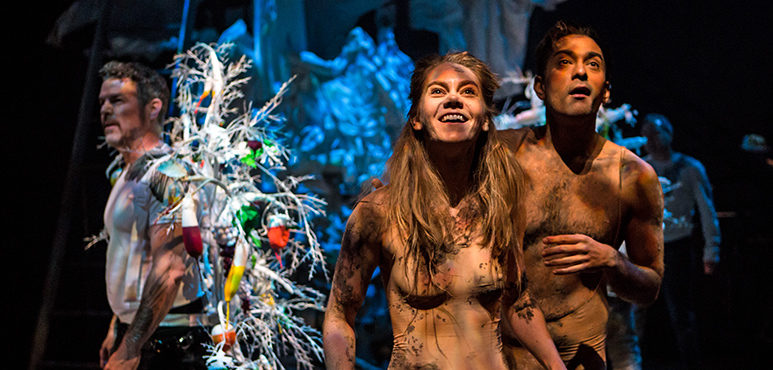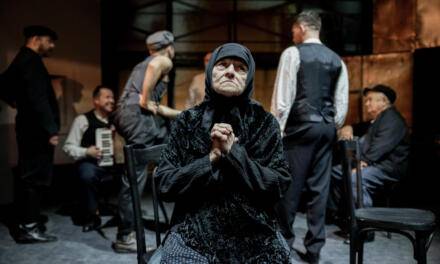“I stared back up through the endless tunnel down which we’d been hurled—cursing the Almighty for sentencing us to hell,” she tells us.
Then comes that wicked, mischievous smile and the words— “wouldn’t you?” She is wasting no time in seeking to seduce us into her devilish embrace.
Peacock, in her 31st year as a member of the festival company, has chalked up another entry for the memory books. She’s playing Satan—the central figure in Canadian playwright Erin Shields’s brilliant and subversively funny adaptation of John Milton’s poetic masterpiece. And if we have difficulty resisting her allure, it’s understandable. Peacock’s Satan, a cunning and malign charmer, is an overwhelming presence well served by the festival’s intimate Studio Theatre. She is, quite frankly, irresistible—just as Satan is in the great poem that inspired this astonishing Stratford premiere.
Notwithstanding that Paradise Lost chronicles the struggle between good and evil—treating us to a discourse on the perils of making “a heaven of hell and a hell of heaven”—there is no denying that the primary enjoyment factor in Milton’s great poem was, and is, Satan. Some may find Erin Shields too free-wheeling, too anxious to relate her adaptation to contemporary concerns, but she can easily reply that the themes of the poem are eternal, regardless of the trappings. And in the case of Satan, this adaptation is true to the sensibility of the original.
John Milton’s devil is charismatic. And so is Peacock, a smilingly confident temptress, secure that she can finally get the best of God and persuade us to follow her into her own hellish domain. Jackie Maxwell’s splendid production encourages Peacock to have fun in this role, to revel in Satan’s wit and intellect and conviction that she is still capable of leading us all astray. But it’s not all fun and games. We’ll also be seeing the fallen angel, writhing against her banishment into hell, yet still yearning for God’s acknowledgment of her reality. Those flashes of anger and resentment can cut through that deceptively winning facade. Peacock’s Satan is complicated.
Paradise Lost is essentially about The Fall—about what happens to Adam and Eve when they eat the forbidden fruit and are banished from Eden. Qasim Khan and Amelia Sargisson are delightful and touching as two innocents who are ripe for the plucking—and Peacock’s Satan shows a serpentine resourcefulness in the scene in which Eve is seduced into biting into the apple.
Indeed, the expulsion from Eden provides some of the production’s most riveting moments. In directing the play, Maxwell extracts a powerful visual poetry here, but she is also attentive to a rueful subtext, so true to the world of Milton, about the fault lines that emerge in relationships that have lost their innocence.
God is present in all this: in Juan Chioran’s performance, a worried deity, but one quietly confident of one more victory—or is he? Gordon S. Miller’s son of God is a tranquil and reassuring presence in the midst of all the metaphysical mayhem, and Sarah Dodd displays an alley cat’s resilience in the role of Sin.
Designer Judith Bowden has come up with imaginative costuming that suits the needs of the play, particularly when it comes to the discreet but effective choices she makes for the Garden of Eden. But that towering rack of shirts, pristinely white at the top and soiled at the bottom, is bewildering in whatever symbolism it is trying to convey. Still, one can’t quibble. Paradise Lost is a stellar achievement.
(Paradise Lost continues to Oct. 14. Further information at 1-800-567-1600 or stratfordfestival.ca)
This article first appeared in Capital Critics’ Circle on August 29, 2018, and has been reposted with permission.
This post was written by the author in their personal capacity.The opinions expressed in this article are the author’s own and do not reflect the view of The Theatre Times, their staff or collaborators.
This post was written by Jamie Portman.
The views expressed here belong to the author and do not necessarily reflect our views and opinions.




![Alice Birch’s “[BLANK]” at the Donmar Warehouse](https://thetheatretimes.com/wp-content/uploads/2019/10/image-3-440x264.jpg)













